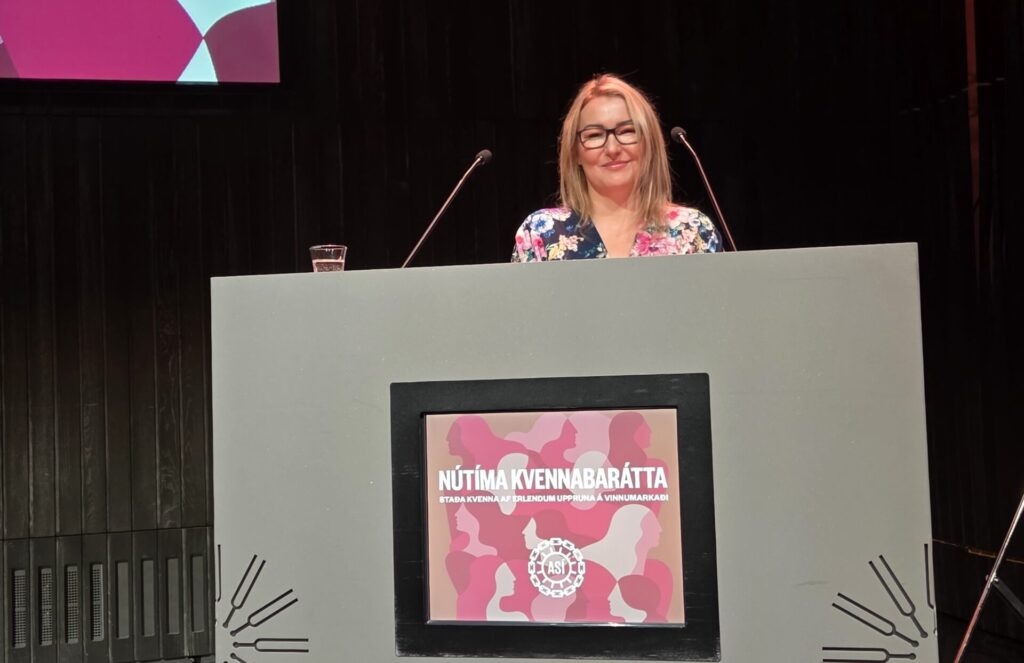
“The children we work with are the future, but the staff who care for them are often invisible.” This was among the statements made by Bożena Raczkowska, a representative on Efling’s union council, in a speech about the situation of immigrant women in Efling. Bożena delivered her speech at the conference Modern Women’s Struggle – The Status of Women of Foreign Origin in the Workforce, organized by the Icelandic Confederation of Labour (ASÍ) on the occasion of the 2025 Women’s Strike.
Bożena moved to Iceland from Poland in 2006 and has lived here for 19 years. She is a single mother of two children, rents an apartment on the private market in Reykjavík, and has worked in a preschool for 15 years, the last few as a department manager. In her speech, she described her experience as an immigrant woman and preschool worker, recalling her first years on the job.
“When I started working in the infant department in 2011, I had to work at full speed right away; there was no time to learn or adjust to a new job. I thought it was just normal, that this is how it was here. Staff were often missing, and at that time, there were frequent changes of department managers.”
Bożena and her colleague, also of foreign origin, tried to support each other in challenging circumstances.
“It takes a lot of patience and a big heart for these dear little children so that they feel safe with us — and no less for the parents.”
Immigrants are expected to work more
“On my journey, I have met many immigrant women. They tell me the same stories: low wages, language difficulties, the feeling of not belonging — despite wanting to belong with all their heart. Even though I am Polish, I want to speak for all women who have moved here, women who may be newly arrived, who struggle with the language, who work a lot but get little.”
She pointed out that these women are the backbone of society, working in essential services such as preschools, nursing homes, and cleaning.
“We are the backbone, yet few see us.”
When Bożena arrived in Iceland, there were few immigrants in the country.
“I had to learn a completely new culture, so different from the Polish one. Most Icelanders were kind to me, but it was still easy to sense that one was somewhat less valued — not from the United States, but from Eastern Europe. I also felt that it was assumed I would work more, simply because I was a foreigner, and that I would not stand up for my rights.”
Burnout and recovery
Bożena described how stress and lack of support led to burnout in 2024.
“I don’t have a mother or sisters here that I can turn to, talk to, or find support from. As a single mother and department manager, without family support and without the opportunity to rest after work, I was constantly on the go — while trying to be both the best mother and give my all at work — I experienced burnout in 2024.”
She sought help from VIRK herself and said it was beneficial.
“Many women don’t even know that support like VIRK exists. They don’t know that they have the same rights as Icelandic women. They don’t know that they deserve the same respect.”
“We want to live with dignity”
Bożena noted that around 32,000 women of foreign origin reside in Iceland, accounting for nearly half of all immigrants.
“We work a lot, but when we demand better conditions, we face resistance. It’s as if we don’t have the right to live with dignity.”
She called for real integration measures, not just demands for language skills.
“We women of foreign origin are not fighting for lofty slogans. We simply want to live with dignity. We want to belong. We want our voices to be heard.”
A voice heard in Efling
Bożena has been a member of Efling from the start and a union representative since 2013. She has participated in wage negotiations both with Reykjavík City and private preschools.
“In Efling, I found that our voice mattered — that we, immigrant women, were not invisible and that someone stood with us, both Efling’s board and Sólveig [Anna Jónsdóttir, Efling president]. Sólveig Anna is like one of us — she is also warm, approachable, and supportive.”
Housing crisis — a constant struggle
Bożena also addressed the housing problem, which she called one of the greatest justice issues of our time.
“I rent an apartment, and 70% of my salary goes to rent. My landlord raises the rent every year. For women like me, and many other immigrant women, this is a constant struggle.”
She emphasized the need for social housing and protection against unfair increases.
“We cannot build a future if the foundation — a roof over our heads — is insecure.”
“We will not be forgotten”
Finally, Bożena concluded her speech by emphasizing that immigrant women will never give up and will continue to fight for the respect they truly deserve.
“It is difficult to be an immigrant woman in Iceland. It is a constant struggle. But we will not give up. We are part of this society. We will not be forgotten. We will fight for a better future — for ourselves, for our children, and for Iceland.”